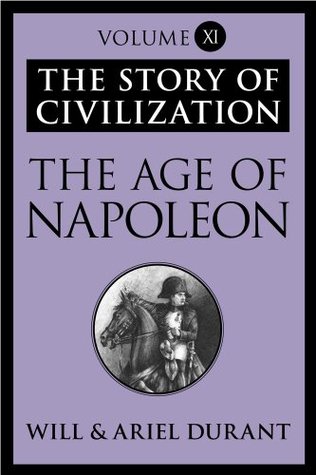More on this book
Kindle Notes & Highlights
by
Will Durant
Read between
November 15 - December 10, 2019
He was a good man, but hardly a good king.
We can imagine their contents by noting the descent of the word libel from their name libelles—little books.
Jean-Paul Marat was the most radical, reckless, ruthless, and powerful of the new scribes.
Those who wallow in wealth must supply the wants of those who lack the necessaries of life”; otherwise the poor have the right to take by force whatever they need.
Talleyrand is one of the doubly intriguing characters in history.
He considered himself “paid but not bought”;
“The old nobility,” said Napoleon, “would have survived if it had known enough to become master of printing materials…. The advent of cannon killed the feudal system; ink will kill the modern system.”
Condorcet was their theorist, philosopher, specialist in education, finance, and utopia; we have long since paid our debt to him.ITheir
“Plutarch prepared me to be a republican.”
“He knew, as all these men knew, that almost from hour to hour he carried his life in his hand.”
“Death!—a king is made useful only by death”; Millaud said, “Today, if death did not exist, it would have to be invented”—
perpetrated on their favorite defender.” When the
“I have done my duty,” she said; “let them do theirs.”
“I killed one man to save a hundred thousand.”
“She has killed us, but she has taught us how to die.”
“that man,” he said, “has not wits enough to cook an egg.”
“long laws are public calamities.”
Democracy is good, but in wartime it should yield to dictatorship.
The Terror was a recurrent mood as well as a specific time.
France would soon be no more than one monstrous cemetery.”
“The Revolution,” said Vergniaud, “is like Saturn, it is devouring its own children.”
“We will make France a graveyard,” he vowed, “rather than not regenerate it in our own way.”
“we shall all be guillotined, one after another.”
as modest in his habits as he was bold in his ideas.
As the property of the executed reverted to the state, it was a profitable Terror.
Liberty is no nymph of the opera, nor a red cap, nor a dirty shirt and rags. Liberty is happiness, reason, equality, justice, the Declaration of Rights, your sublime Constitution [still hibernating].
“My friends, don’t confuse me with these rascals.”
“Let us,” he said, “leave something to the guillotine of opinion.”
“I would rather be guillotined than guillotine others,” he said (it had not always been so); “and, besides, I am sick of the human race.”
In revolutions authority remains with the greatest scoundrels.”
Ah, better be a poor fisherman than meddle with the governing of men.”
Robespierre, embodiment of virtue, applied a torch to Atheism, but an ill wind diverted the blaze to Wisdom.
power dements even more than it corrupts, lowering the guard of foresight and raising the haste of action.
Youngsters, constitutionally rebellious, were now rebelling against revolution; they organized themselves in bands called Jeunesse Dorée (Gilded Youth), Merveilleux (Freaks), or Muscadins (Fruits);
The people, said Boissy d’Anglas, are not wise or stable enough to determine the policy of a state.
If survival is the test of worth, Barras was the most able, serving first Louis XVI, then Robespierre, and helping both of them to their deaths; maneuvering safely through crisis after crisis, through mistress after mistress, gathering wealth and power at every turn, giving Napoleon an army and a wife, outliving them, and dying in easy circumstances in re-Bourbonized Paris at the age of seventy-four (1829);1 he had nine lives and sold them all.
“No intellectual exercise,” said Lord Acton, “can be more invigorating than to watch the working of the mind of Napoleon, the most entirely known as well as the ablest of historic men.”
“Perhaps it would have been better if neither of us had ever been born.”
Her child seemed to remember all this with his blood, for he was never so happy as in war. He remained to the end a Corsican, and, in everything but date and education, an Italian, bequeathed to Corsica by the Renaissance.
History was for him, as for Carlyle, a worship and rosary of heroes, especially those who guided nations or molded empires.
Virtue, for me, consisted of what you made it.”
He could overawe his generals, but he could not free himself from the spell that Josephine laid upon him.
He was congenial to Italian speech and ways, appreciative of Italian women, music, and art; they did not realize at once how fondly he appreciated Italian art.
whose citizens were to share with the French in liberty, equality, fraternity, and taxes.
“Non tutti Francesi sono ladroni, ma buona parte”
Most of the spoils were sent to the Directory, were received there with pleasure, and found their way into the Louvre, where the Mona Lisa, though raped, never lost her smile.
“the true conquests, the only ones that leave no regrets, are those that are made over ignorance.”
“Forty centuries have their eyes upon you.”
aut Caesar aut nullus—either Caesar or nobody.


